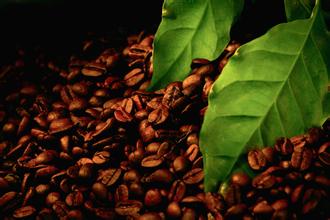Introduction of Paradise Bird Manor in Coffee Manor of Papua New Guinea
New Guinea is a large mountainous island shared by Indonesia and Papua New Guinea. The island's alpine aborigines were not discovered by the Australian Mick Leahy until 1930. They retained a primitive civilization and became a paradise for anthropological studies.
What is particularly amazing is that the video taken by Mick when he first went to the mountain to meet the aborigines was preserved and later combined with interviews with the locals to produce a documentary about the contact between the Highland aborigines and modern civilization. The film is called first contact (first contact). After its release in 1983, the film shocked the world and won numerous awards. Images like this have never been seen before and have never been seen since, and they are really excellent. The follow-up story is also fascinating: Mick grew up in a tribe with Joe, the son of a local aboriginal, and later received a Western education in a white school, becoming a middleman across two cultures. He planted coffee in the highlands and made a fortune. His attempt to expand the coffee plantation was recorded and made into two documentaries with "first contact" and called the Highland Triple.
The law of history always tells us that a heterogeneous new civilization must bring a period or a certain degree of loss and pain to the recipient. But the situation in Papua New Guinea looks even worse, and what is happening there can only be described as chaos and bloodshed. No one can say exactly why. Frequent violence, endless tribal vendetta, lack of resources, lack of medicine and medicine. The old is dying, and the new is not being built. People there say they don't see the hope of this country.
Women in Papua New Guinea are generally subjected to brutal domestic violence. In traditional culture, women have always been regarded as the private property of men and can be beaten and scolded at will, and they do not live together after marriage and sleep with their wives at night. Although the introduction of modern civilization made the couples there learn to live together, they never learned how to get along. In addition, men are idle and pay attention to appearance, while women farm and support their families, bearing all the burden. Some anthropologists believe that this custom stems from the imitation of birds of paradise (birds of paradise, local specialties). The male bird has beautiful feathers, while the female is not beautiful and is responsible for laying eggs and hatching eggs.
The vast majority of coffee in Papua New Guinea is organic coffee, but it is not intentional by the local people. it is really because of inconvenient transportation and economic hardship, the average coffee farmer is determined not to buy it, nor can he afford chemical fertilizer. Bird of Paradise coffee has a lively flavor, with bright sour and fruity aromas. Unlike the dreary taste of Asian beans, it has the meaning of African beans. As a result, although it is not a famous show, it is cleverly likable. It comes from the high mountains on the island, and there are birds of paradise singing on the coffee tree. In the past, my knowledge and imagination were limited to this.
The more you understand, the heavier you feel. A cup of Bird of Paradise unexpectedly carries a cultural tragedy. Coffee farmer Joe eventually went bankrupt because of tribal clashes that caused a large number of casualties when the coffee was ripe and needed to be picked. As a result, the coffee rotted in the field, and Joe went to a civilized land.
Coffee, there are too many stories waiting for us to know, if you still have feelings for this troubled world.
Coffee, must have a temperature

Important Notice :
前街咖啡 FrontStreet Coffee has moved to new addredd:
FrontStreet Coffee Address: 315,Donghua East Road,GuangZhou
Tel:020 38364473
- Prev

Washed Nicaraguan Coffee Lemon Tree Manor introduces Matagalpa producing area
The suitable climate provides an excellent growth environment for the cultivation of coffee. The mineral-rich pozzolanic soil provides abundant nutrients for the cultivation of coffee trees. High-quality Nicaraguan coffee is also grown in the northern and central highlands of the country. The best coffee is produced in Matagalpa (Matagalpa), which is highly respected by coffee lovers all over the world.
- Next

Introduction of Kopi Luwak Manor in Indonesia
Kopi Luwak, also known as civet coffee. The official name of Kopi Luwak is Kopi Luwak. Kopi means coffee in Indonesian and Luwak is a wild civet in Indonesia. The coffee is commonly known as Kopi Luwak because it is made from beans picked from the droppings of civets. Kopi Luwak, produced in Indonesia, grows a lot of coffee crops.
Related
- Does Rose Summer choose Blue, Green or Red? Detailed explanation of Rose Summer Coffee plots and Classification in Panamanian Jade Manor
- What is the difference between the origin, producing area, processing plant, cooperative and manor of coffee beans?
- How fine does the espresso powder fit? how to grind the espresso?
- Sca coffee roasting degree color card coffee roasting degree 8 roasting color values what do you mean?
- The practice of lattes: how to make lattes at home
- Introduction to Indonesian Fine Coffee beans-- Java Coffee producing area of Indonesian Arabica Coffee
- How much will the flavor of light and medium roasted rose summer be expressed? What baking level is rose summer suitable for?
- Introduction to the characteristics of washing, sun-drying or wet-planing coffee commonly used in Mantenin, Indonesia
- Price characteristics of Arabica Coffee Bean Starbucks introduction to Manning Coffee Bean Taste producing area Variety Manor
- What is the authentic Yega flavor? What are the flavor characteristics of the really excellent Yejasuffi coffee beans?

